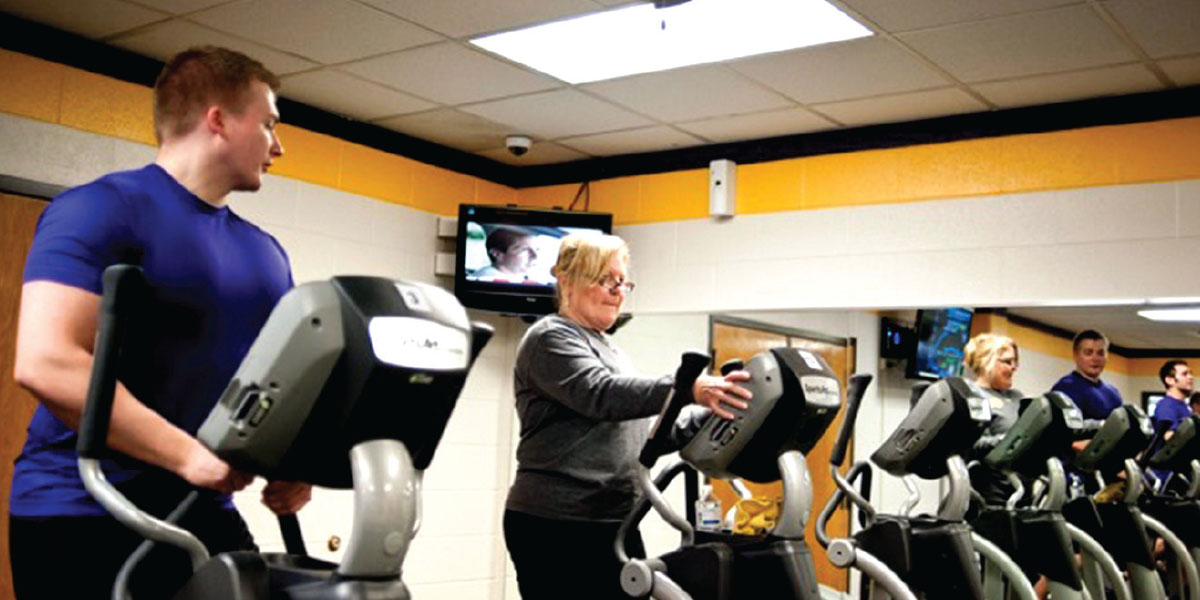Tennessee Tech University’s new Fitness CenterGreen Room brought opportunity for investment, competition, sustainability, and energy savings—all in a fun package —says TTU’s Vice President for Business and Planning Claire Stinson.
In January, TTU, in Cookeville, installed a combination of 16 ellipticals, recumbent cycles, and upright cycles from the Green System by SportsArt to replace some of the older equipment. The fitness products convert about 75 percent of user-generated energy back into the fitness center’s electrical system as reusable energy.
Budget-Friendly Energy Boost
Each piece of equipment is connected to a DC voltage booster that sends the human-generated energy back into the building’s power grid through inverters. The amount of money saved on the university’s energy bill varies, but machines running at full speed for an hour can generate enough power to run a laptop for 40 hours or a dishwasher for 2 hours, according to data collected by the equipment vendor.
“In light of significant budget cuts, we got a small group together to explore energy-saving ideas and sustainability activities,” Stinson says. “What began as a business office and facilities conversation soon expanded to include an engineering faculty member with extensive experience with directing industrial assessments, our fitness center director, and members of the sustainable campus committee.”
This project aligns perfectly with TTU’s campus community commitment to green initiatives. In 2005, students voted in a sustainable campus fee of $8 per undergraduate per semester. This generates hundreds of thousands of dollars that are strategically spent each year on projects to make the campus greener. A sustainability committee solicits proposals each year, and everyone on campus has a lot of input into which improvements are made.

“The element of energy savings is important, but the most valuable result of this project is the level of awareness it has given students about energy conservation,” says Stinson.
Fostering Physical Fitness
“The concept also allows our university to leverage the competitive nature of students, motivating them to challenge each other’s exercise efforts,” says Stinson. “Competition pushes some students to become more physically fit and other students to maintain or increase their fitness levels.”
In fact, Tennessee Tech won the world’s first Kilowatt Throwdown against Chapman University, Orange, California, in a contest between the schools to see which produced the most electricity for the power grid.
Does the system have a payoff? Stinson says yes, definitely. “It positively affects retention and recruitment,” she says. “It makes the on-campus environment more interesting and motivates students to stay on campus. It contributes directly to student success and student satisfaction.”
Suzann Hensley, TTU campus recreation assistant director, says the social aspect of the system has won students and members over. “They track and share their workout results. They compete, and they conduct studies.”
Tennessee Tech stepped into the effort not knowing exactly what the response would be, but it was an exciting opportunity to be the first university in the country to commit to a whole room dedicated to going green.
“We were OK with being a part of the system’s developmental stages, and it has paid off. Fortunately, we have university leaders such as Claire Stinson who not only want something great, but aren’t afraid to be a part of its early development,” says Hensley. “Without her foresight and support, this would not have happened.”
SUBMITTED BY Karen Lykins, associate vice president, communications and marketing, Tennessee Tech University, Cookeville


